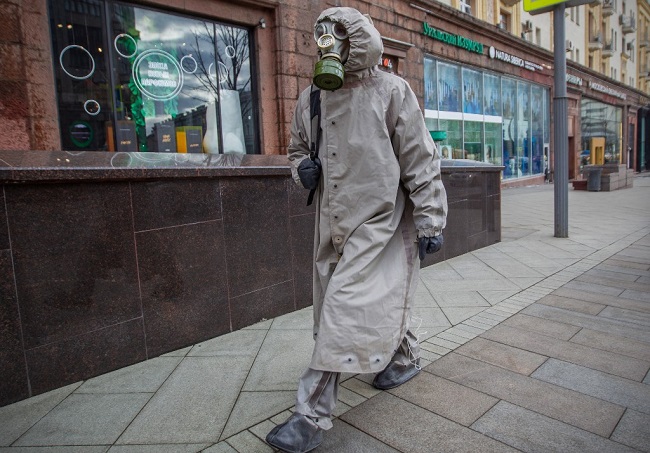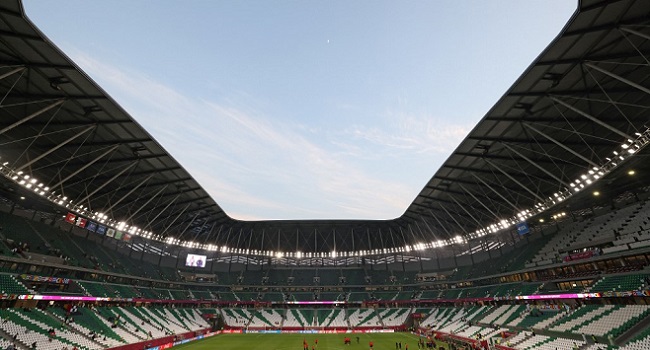
Pushing aside a flap, hungry men and women enter a darkened tent in the courtyard of a Moscow church.
“Only two per table please,” says Valentina, a volunteer in a hospital gown, gloves and surgical mask.
“Don’t crowd!” she says, and three men move silently apart, sinking spoons into powdered mashed potatoes.
Only 16 people are allowed in at a time — in a space that normally would accommodate dozens.
The repurposed army tent dubbed the Rescue Hangar is one of the few places where the Russian capital’s growing homeless population can find food and medical aid during the coronavirus lockdown.
Affiliated with the Orthodox Church and funded mostly by donations, the hangar normally serves around 100 people per day.
But since Moscow imposed its lockdown to slow new coronavirus infections, as many as 500 visit in search of a hot meal on some days, volunteers say.
The city of 12 million has only one government shelter, so its homeless have long had to rely on charity.
They used to be able to count on workers at restaurants setting aside leftovers, but this ended when they closed with the lockdown.
With residents shut in to their apartments, homeless people are also not getting the street handouts they often used to buy food.
“The decrease in people traffic in Moscow has been a huge blow to the homeless population,” says Roman Skorosov, the Rescue Hangar coordinator.
Many are even struggling to find hot water or a toilet since shopping centres closed, charity workers told AFP.
And their numbers are growing.
“There are a lot of newly homeless, people who worked odd jobs without contracts and lived in cheap hostels,” Skorosov says.
“They are now on the streets.”
– Sleeping on trains –
Vladimir Petrovsky, who has been sleeping rough for several years and visited the Hangar for a meal, jokes that he has a “three-bedroom flat” — referring to Moscow’s three central train stations many favour for shelter.
With restrictions tightened at stations and parks, Petrovsky is sneaking onto a late-night suburban train out of Moscow, then taking an early morning train back to the city. The strategy lets him sleep for about four hours.
Volunteers say police have fined some homeless people who have failed to produce a mandatory pass for being outside, introduced in Moscow during the lockdown.
Petrovsky, a 67-year-old Ukrainian, said police have let him go with a warning after he failed to produce a pass.
“How can I get a pass if I don’t even have a passport?” he asks.
Finding a meal has become more difficult, he says, with police targeting some groups who feed the homeless.
Last week police detained four volunteers from Kursky Train Station Homeless, which brings hot food to the station twice a week, says its coordinator Oleg Olkhov.
“They were accused of creating a crowd and fined,” Olkhov says, pledging to continue providing food.
“Twice the usual number of people now come for meals,” he says.
– ‘15,000 homeless’ –
When Moscow’s mayor ordered the lockdown in March, activist Alania Zhurkina reached out to the city government, calling for a strategy to help at-risk homeless people self-isolate.
The energetic redhead who directs the House of Friends charity received a reply one month later that the city operates a shelter.
That facility has a capacity of about 1,000, while the number of homeless in Moscow is estimated at some 15,000, Zhurkina says.
Many in need are not local and have fallen through the cracks of unemployment support.
“It’s not their fault that in Russia you often need to come to Moscow to find a job,” she says.
Zhurkina has taken matters into her own hands, arranging to rent cheap hostels that normally house Moscow’s temporary labourers.
Her “Shelter” project already has a waiting list of 200 people and she launched a second hostel this week.
Even though her organisation’s funds are drying up, Zhurkina says she will not bother writing to the city again for help.
“What am I going to do, wait another 30 days for a reply?” she says. “The city has forgotten that homeless people exist.”
AFP




